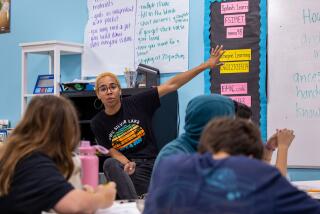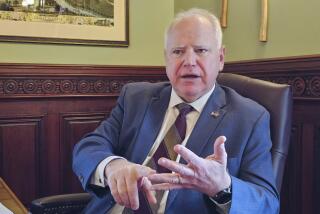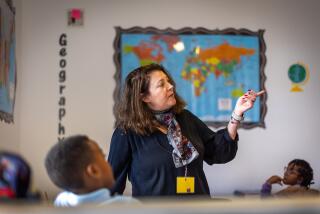She’s at the Head of the Class : Patricia Ann Baltz has impaired sight and limited mobility. But she’s overcome the obstacles and inspired her students. When it comes to teaching,
ARCADIA — Nine debilitating strokes put Patricia Ann Baltz in a wheelchair and impaired her sight, but they have not kept her from teaching.
Whether taking her fourth-grade students on a treasure hunt or teaching them math with a rhythmic “Division Rap,” Baltz has found new ways to make learning fun for hundreds of students at Camino Grove Elementary School in Arcadia.
Baltz, 43, recently was honored as the California Department of Education’s Teacher of the Year for her leadership in starting innovative programs and her determination to teach despite her health problems.
Baltz, who was selected by a panel as one of 12 Los Angeles County nominees for the honor, reached the round of five statewide finalists and then was chosen last month as the teacher who will represent California in the national Teacher of the Year program next spring.
“Eight months ago I was in a hospital bed and I couldn’t walk or talk,” said Baltz, who suffered her latest stroke in March. “I get weepy when I think of the incredible ups and downs of this year.”
Baltz had been teaching in the Arcadia Unified School District for two years when she suffered her first stroke shortly after her son, K.C., was born in 1974. Doctors blamed it on weakness from the pregnancy, noting that she was extremely anemic in the months before the birth and had numerous fainting spells.
But when she suffered one stroke after another, went through 10 months of seizures and spent more than half of her son’s first five years in the hospital, she knew there had to be something terribly wrong. Doctors were unable to diagnose her problem.
She lost all hope of regaining a normal life.
“It was a lot of work in the hospital,” said Baltz, who was hospitalized for five straight months at one point. “You get dressed, you go to therapy, you have lunch and you go back to therapy.”
Baltz said being away from her husband and baby son added to the fatigue and doubts about her future.
“I gave away all my teaching supplies,” Baltz said. “I never dreamed I’d return to class.”
Her questions were answered, however, when a cardiologist, who was also a family friend, examined her and discovered she had two faulty heart valves and a hole between two chambers of her heart, which cut down oxygen flow to her brain.
In 1979, surgeons sealed the hole and inserted a metal prosthetic valve in her heart, stopping the strokes. By 1983, she was physically ready to return to teaching, but she had doubts about whether she could handle the responsibilities again.
“Will I remember how to teach?” Baltz remembered asking herself. “Will I remember how to control the kids, and how will they react to my leg brace and wheelchair?”
She returned to teaching at Camino Grove in 1983 and was unhampered by medical problems until February when she had an unrelated surgery. Temporarily going off blood-thinning medications during her recovery, she suffered another stroke in March. After weeks of speech therapy, she returned to the classroom in May.
Baltz still undergoes physical therapy after school to help her walk--albeit slowly--with the aid of a cane. “Sometimes I see people walking or running and I think, ‘Gosh, it would be neat to do that,’ ” Baltz said wistfully. “But when I get up and walk, I have to think through every muscle movement I make.”
Baltz does not dwell on the handicap, however. She points instead to her speedy recovery and recent accolades with a sense of humor.
“You’ve heard of Jaime Escalante and ‘Stand and Deliver,’ right?” Baltz asked, her blue eyes sparkling. “Well, my husband, Bill, calls me ‘Sit and Deliver.’ ”
Because they see Baltz in a wheelchair almost every day, her students understand the needs of the physically challenged, Baltz said. When she had a difficult time speaking after her latest stroke, the children were patient and helped fill in sentences she could not finish.
“My students don’t think of me as handicapped, they see me as handi- capable, “ Baltz said. Students even vie to be the class officer who gets to wheel Baltz in and out of her classroom.
“The kids accuse me of speeding, actually,” she added.
Her warm relationship with her students is obvious to anyone who walks into Room 11. The windows are lined with get-well-soon balloons and giant construction paper cards on which children had scrawled “Congrats Mrs. Baltz, you’re 1” with crayons.
Kristie Winick said she enjoys art because “Mrs. Baltz always gives us fun things to do.”
“Mrs. Baltz is the best!” Charlie Lopez chimed in, as a dozen other 9- and 10-year-olds gathered around to sing their teacher’s praises.
“She makes history easy,” Ashley Rice said, but Stephanie Franco favored Baltz’s spelling bingo game. Emily Kitajima said she enjoys science because Baltz “makes it really fun.”
Although Baltz studied English literature at UCLA, she has branched out to become a science mentor at Camino Grove. As a mentor, she works with other teachers to introduce hands-on ways of teaching science.
“She’s an acknowledged leader in our district for both computer-assisted instruction and elementary science,” said Terrence Towner, superintendent of Arcadia schools.
“She wanted computers for her kids, so she wrote grants to get them,” Towner said. Baltz now uses a color MacIntosh computer and laser disc player to teach students about animals, plants and other science topics.
One of her projects teams a high school student with each of her 30 fourth-graders for a science contest called the Cross-age Science Challenge. The contests, which take place every quarter, make children interested and curious about science and build ties to older students, Baltz said.
In last quarter’s Egg Drop Challenge, the fourth-graders packed eggs in containers they designed--with the help of their high school “science consultants”--to keep the eggs from breaking.
One by one, they dropped their containers off the high school bleachers and rooted against messy explosions.
The best science projects, as well as the most spectacular failures, earn prizes. Baltz said the fourth-graders also help the high schoolers by measuring chemicals and timing experiments for their biology class.
To teach cooperation, Baltz divides her class into seven teams of three or four students each quarter, giving them names like the “Mean Machines” and “Radical Rockets.” Each team earns points when a team member answers a question correctly in class, helps another student or acts politely.
The teams compete for points weekly in a quiz game called the Friday Question. Baltz prepares a Friday Question topic every week--such as “Who is Ivan Pavlov?”--and students have seven days to research the topic before playing the game.
In the game, students think of seven questions to ask each other about the week’s topic and score points when they stump other students. Parents often get into the act to help their children find some obscure fact for the Friday Question, Baltz said. At the end of the quarter, Baltz treats the team with the most points to a pizza lunch.
To improve her students’ writing, she asks them to keep daily journals. Every Thursday night, they write letters in their journals to Big Guy, a huge brown bear Baltz brings to class on Fridays. They write about the books they read during the week and any other concerns, and look forward to Big Guy’s responses--written by Baltz, but signed with a paw print--the next week.
Baltz said her medical ordeals have actually helped her cope with the demands of the classroom and family by making her more patient.
“You realize how precious life is and how quickly it can be taken away,” she said. “You can’t get upset by the little things.”
Baltz said she plans to teach as long as her health will allow. “I’d love to teach until I’m 65 or 70,” she said.
Her excitement about teaching dates to her childhood, when she sometimes accompanied her mother--also a teacher--to her classroom. Those experiences influenced her to become an educator too.
“By the time I was 9, I knew I wanted to teach,” said Baltz, who was inspired by her mother’s teaching career but has taken a different tack from her traditional approach.
“She said if you make a mistake in class, you should pretend you were just testing the students,” Baltz said. “I say you need to admit that you’re human and make mistakes.”
Although she stresses basic skills subjects, Baltz runs her class in an enthusiastic, non-traditional way. She encourages children to discuss answers to history questions among themselves and yell out answers to math problems she writes on a chalkboard.
“In the classroom of today you want kids interacting and talking,” Baltz said. “We need more curiosity and creativity.”
More to Read
Sign up for Essential California
The most important California stories and recommendations in your inbox every morning.
You may occasionally receive promotional content from the Los Angeles Times.










